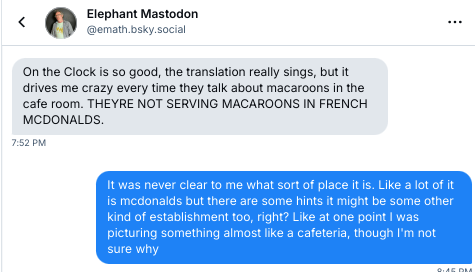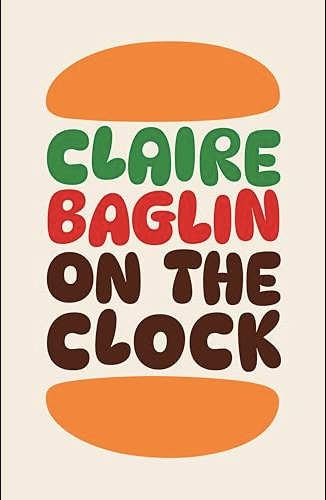As I mentioned last week, I have piece1 out now at the Temz Review covering Kate Beaton’s newest book (booklet?), Bodies of Art, Bodies of Labour (University of Alberta Press), a 70-page essay taken from a speech she gave in Edmonton in 2024, about the need for working-class art and doubling as a survey of the literature of Cape Breton. In the spirit of her book, I wanted to share some recent working-class art that I enjoyed.
On The Clock by Claire Baglin
Translated from the French by Jordan Stump
New Directions, 2025; 144 pages.
A series of vignettes about a French girl who takes a summer job at a fast food outlet, following her from her job interview through her training up until she has to decide whether to take a promotion or quit, all juxtaposed with flashes of her family life and her father’s blue collar job at a factory. I really liked how this focused on the processes of her work, showing us which tasks suck (working out front with customers, the fry station), and which were more desirable (working the drive-thru window). A lot of nice covid-era stuff and little French details that tend to differentiate this from a typical North American fast food experience. Although I was talking to Emmet Matheson, and he thinks it’s not that French fast food establishments are so different, so much as the author is combining several different types of establishment into one.

The jumps between first and third person are a bit confusing, but the novel is short and fast paced. You ever read a war novel where the humblest meal is elevated into something mouth-wateringly savoury? I think even the most menial work is elevated by a good story that takes it seriously, showing us the trivial and arbitrary drudgery and the management’s attempts at humiliation. Not that there’s dignity in the job, this is soul-crushing work designed to use people up, and we forget that because it’s so common, but there’s something important about not turning a blind eye to it.
Two Days, One Night (2014)
Directed by Jean-Pierre and Luc Dardenne
Starring Marion Cotillard, Fabrizio Rongione
95 minutes
As I was writing the above, I realized Baglin’s restaurant specifically reminded me of the cafeteria the husband works at in the Dardenne brothers’ film Two Days, One Night. The cafeteria only features in one short scene, but this movie definitely belongs on any list of great working-class art. Basically, Marion Cotillard (Talia al Ghul from the Christopher Nolan Batman) is about to be laid off from her job at, I think it’s a lab (I watched this one a few years ago), but she can keep her job if, over the course of a weekend, she can convince her co-workers to give up their own bonuses to keep her on. She’s a mother of two, her husband equally underemployed, and she really needs this job. Cotillard does pretty much everything right (except for that one little suicide attempt halfway through): hold firm against the bosses, don't let them play you off against one another, don't be a rat, count your votes. Still, the economy is shit and solidarity always seems like an expensive luxury.
The film plays like a thriller and it really captures that dread, the knot that ties itself in your stomach on the worst days when you don't want to go into work, when you zone out on the bus trying not to think about it, but at the same time it examines where that pressure comes from and how it's wielded against you.
Down and Out in England and Italy by Alberto Prunetti
Translated from the Italian by Elena Pala
Scribe, 2022; 160 pages.
I swore on my pulped, blistering hand that this time I’d leave for good. But I had a few scores to settle first. Like in the good old days of ‘Operation Unsealed Lips’, I burst into the dining area and spouted a torrent of abuse at the astonished clientele, my seared palm — held out high for everyone to see — conferring sinister tones to my otherwise laughable English. I swore I’d tell all and write the whole sorry story of my time in the UK. I swore it on the blood of all the oppressed, wounded, and humiliated workers.
And with that oath (which replaced my original pledge of loyalty to the Queen) I was free: free from all my demons, from the ghost of Margaret Thatcher, and from sinister forces. Free to live and fight another day. That was me out. Go ahead and hang that ‘vacancy’ sign on the window, update the job centre’s register, make room for all those entitled brats whose unparalleled work opportunities I’d stolen. See how many of them fancy a spot of toilet cleaning. Or sleeping under an asbestos roof. Or searing their hand on an oven handle that doesn’t meet the most basic Health and Safety requirements. Far be it from me to hinder the professional development of the more privileged class — I wouldn’t be so crass!
Okay, so it’s the nineties? Aughts? Whatever, I forgot to take notes on this one because I was enjoying it too much. The point is, the steel mills Alberto’s father’s generation worked at are closed and all that Autonomia shit is dead and gone. What’s a young person to do? For Alberto, there’s England, a land full of shitty pizzerias that can’t quite get it right and thus need Italian waiters to seem authentic. When that falls through, there’s cafeterias in institutions for disabled children and malls that need their toilets cleaned and unclogged.
We’ve covered the soul-crushing side of things, the part where capitalism grinds you down. Here’s the one where you don’t have to let it win, where you can still have fun. And what makes this fun is that Alberto does not give a fuck. Alberto has this great anarchic spirit, always goofing off at work (I think he would take issue with being called an anarchist, though, he was educated by communist priests). He’s a Dante touring the Hell of capitalism, but even fighting chthonic entities in league with the bosses doesn’t get him down. There’s a really great scene set at Pisa’s airport: Alberto’s bag is three times the weight limit because his union dad gifted him his work tools, and now his dad is fighting with the clerks, escorted out to the parking lot. When he goes to check on him, Alberto finds his dad having a cigarette with the security guards, “probably trying to unionise the luggage carriers.”
This one’s great and I’m not doing it justice. Do yourself a favour and just go read it.
My only complaint is that I’ve heard a reference to the murder of Corbyinist Labour MP Jo Cox by a neofascist was removed from the English edition—for shame.
One last thing: longtime readers will remember I made a #heistwatch post about the Brinks 18-wheeler jewellery heist in a California parking lot, possibly one of the biggest jewellery heists in American history, depending on whether you believe the owners or Brinks. Anyways, police have arrested seven guys and recovered some of the loot. Apparently the gang did this before, breaking into trucks containing Apple AirTags and Samsung electronics, and so it sounds like maybe they didn’t know how big a score they were onto (unless it turns out they did follow the truck from the jewellery show). The LA Times has the story along with the amusing bodycam footage of the cops who show up to take the report, where everyone comes off a little dumbfounded. Also, the guys who stole the golden toilet from Blenheim Palace were sentenced. Better luck next time.
More books
Eurotrash by Christian Kracht and Perfection by Vincenzo Latronico
Three comic books: Night Fever by Ed Brubaker and Sean Philips, The Armed Garden and Other Stories by David B, and On the Camino by Jason
Permafrost by Eva Baltasar and The Private Lives of Trees by Alejandro Zamba
Instagram | Goodreads | Letterboxd | Bluesky
You’ll notice a correction has been added to the bottom of the piece. Special thanks to Neil Wilcox for spotting the error.






I haven’t read On The Clock but I bet I can solve the McD’s or not debate, as they have a separate cafe-ish section inside them in most countries outside the US, called McCafe, which indeed serves espresso drinks and macarons (terrible) in France. I can’t say I’ve ever been in a maccas in canadia so maybe they don’t have McCafe there either? The Italian and Australian ones have displeasingly decent espresso though 😊